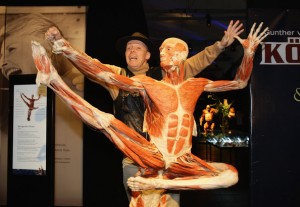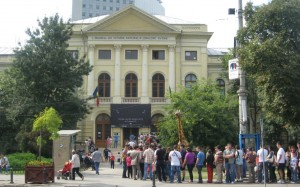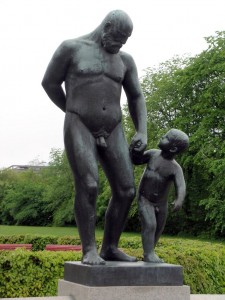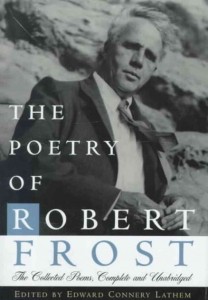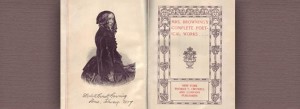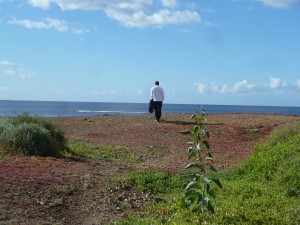
Patrick Henry Pearse Memorial House
Poetry in Translation, (CCCI): Patrick Henry PEARSE (1879-1916), Ireland: “Răsculatul” , “The Rebel”
Răsculatul
P.H. Pearse (1879-1916), Irlanda
M-am născut din sămânţa neamului meu, un neam plin de durere,
Fără altă comoară decât speranţa
Unei glorii strămoşeşti.
Maica-mea m-a născut în robie, în robie s-a născut maica mea,
Eu sunt zămislit din sânge de iobagi;
Copiii cu care m-am jucat in ţărână, bărbații și femeile cu care
am mâncat impreună,
Au suferit în robia zbirilor, sub biciul stăpânului,
Iar noi, fiind blânzi din fire, i-am servit pe netrebnici;
Mâinile care mi-au strâns mâna, mâinile dragi mie
Au purtat cătușele durerii, ce au mușcat adânc încheietura mâinii,
Am crescut greu, în cătușe și în robia străinilor,
Sunt sânge din sângele celor smeriţi, os din oasele lor,
Eu, cel care nu şi-a plecat capul nimănui;
Eu, care am un suflet mai nobil decât sufletul vechililor nostri,
Eu, care am viziunea, profeția și darul proorocirii de foc,
Eu, care am vorbit cu Domnul pe culmea Prea-Sfintei Golgote.
Și pentru că sunt născut din sângele oamenilor, am înțeles oamenii,
Trăiesc durerea lor, împărtăşesc visurile lor:
Inima mea este îndurerată de suferinţa mamelor,
Ochii mei sunt umezi de lacrimile copiiilor.
Am tânjit cu bătrâni şi nostalgici
Şi am râs şi am blestemat laolaltă cu cei tineri;
Împartaşesc cu ei ocara de care mi-a fost ruşine,
Ruşine căci au tânjit în robie, în loc sa fie liberi,
Ruşine că au tânjit înfometaţi, într-o lume de oameni sătui,
Ruşine că au trăit în frica judelui şi a satrapilor lui,
Cu jalbele lor de judecată şi cu cătuşele lor,
Oameni meschini şi răi!
Aş fi ales mai de grabă să-mi fi biciuit trupul, decât să trăiesc ruşinea semenilor mei.
Iar acum vă spun vouă, plin de chibzuinţă:
Le spun oamenilor mei şi în numele lor ma adresez vechililor
neamului meu.
Căci adevăr spun oamenilor mei, fiindcă ei sunt sfinți si nobili, în ciuda cătuşelor lor,
Căci ei sunt mai presus decât cei care-i ţin in robie, mai puternici,
mai curaţi,
Căci ei au nevoie doar de curaj ca să ceară, în numele Domnului-
Dumnezeul nostru, a-Tot-Ştiutorul, Dumnezeul Prea-Iubitor
al oamenilor,
Pentru care a fost răstignit gol, suferind ruşinea.
Căci eu le spun stăpanilor oamenilor mei: luaţi seamă,
Luaţi seamă de ceea ce va veni, luaţi seamă de cei care vor reînvia,
Care îşi vor lua tot ce voi nu veţi fi dat.
Oare, v-ar fi trecut, cumva, prin minte, că veţi fi supus oamenii,
Sau ca Legea ar fi fost mai presus decât viaţa, decât dorinţa oamenilor de a trăi liberi?
Vă vom pedepsi chiar cu pedeapsa voastră, voi, cei care aţi jefuit,
Voi, care aţi lovit şi mituit, voi, tiranilor făţarnici şi inşelători!
(Rendered in Romanian by Constantin ROMAN,
London © 2014 Copyright Constantin ROMAN, London)
* * * * * *

Patrick Henry Pearse
The Rebel
P. H. Pearse (1879-1916), Ireland
I am come of the seed of the people, the people that sorrow,
That have no treasure but hope,
No riches laid up but a memory
Of an Ancient glory.
My mother bore me in bondage, in bondage my mother was born,
I am of the blood of serfs;
The children with whom I have played, the men and women with whom I have eaten,
Have had masters over them, have been under the lash of masters,
And, though gentle, have served churls;
The hands that have touched mine, the dear hands whose touch is familiar to me,
Have worn shameful manacles, have been bitten at the wrist by manacles,
Have grown hard with the manacles and the task-work of strangers,
I am flesh of the flesh of these lowly, I am bone of their bone,
I that have never submitted;
I that have a soul greater than the souls of my people’s masters,
I that have vision and prophecy and the gift of fiery speech,
I that have spoken with God on the top of His holy hill.
And because I am of the people, I understand the people,
I am sorrowful with their sorrow, I am hungry with their desire:
My heart has been heavy with the grief of mothers,
My eyes have been wet with the tears of children,
I have yearned with old wistful men,
And laughed or cursed with young men;
Their shame is my shame, and I have reddened for it,
Reddened for that they have served, they who should be free,
Reddened for that they have gone in want, while others have been full,
Reddened for that they have walked in fear of lawyers and of their jailors
With their writs of summons and their handcuffs,
Men mean and cruel!
I could have borne stripes on my body rather than this shame of my people.
And now I speak, being full of vision;
I speak to my people, and I speak in my people’s name to the masters of my people.
I say to my people that they are holy, that they are august, despite their chains,
That they are greater than those that hold them, and stronger and purer,
That they have but need of courage, and to call on the name of their God,
God the unforgetting, the dear God that loves the peoples
For whom He died naked, suffering shame.
And I say to my people’s masters: Beware,
Beware of the thing that is coming, beware of the risen people,
Who shall take what ye would not give.
Did ye think to conquer the people,
Or that Law is stronger than life and than men’s desire to be free?
We will try it out with you, ye that have harried and held,
Ye that have bullied and bribed, tyrants, hypocrites, liars!
* * * * * *

Patrick Henry Pearse
Biography:
Patrick Henry Pearse (1879-1916) was born in Dublin of an English father, who migrated to Ireland and an Irish mother, from County Meath. He was educated at Westland Row Christian Brothers School and at the Royal University (University College Dublin), where he studied Law and was later called to the Bar: he never, actually, practised Law.
During Easter week Pearse served at the rebellion headquarters – the General Post Office (GPO), Dublin. Here, along with six other signatories, signed the ‘Proclamation of the Irish Republic’, which he, as Chairman of the Provisional Government, read to the public, on the 24 April, 1916. This signalled the beginning of the Easter Rising.
Lacking any military experience, Pearse attempted to defend the heart of Dublin, not only from British reinforcements, but also from its own slum dwellers, who began to loot the high-class shops of Sackville Street (now O’Connell St.). As fire swept through the GPO, on the 28 April, he helped organise its evacuation. As a consequence of the fighting between the rebels and the British army, about 250 uninvolved civilians were killed. At noon the next day, he accepted the majority view of the leadership that they would have to negotiate with the British troops to prevent further slaughter of civilians and save the lives of their followers. At 3.30pm, on 29 April 1916, he surrendered, unconditionally, on behalf of the Volunteers, to Brigadier-General W. H. M. Lowe, in Parnell Street.
Following a court martial, at Richmond Barracks, for his part in the Easter Rising, Pearse exclaimed:
‘You cannot conquer Ireland! You cannot extinguish the Irish passion of Freedom! If our deed has not been sufficient to win Freedom, then our children will win it, by a better deed’.
Pearse was only thirty-six years old when he was sentenced to death. He was executed by firing squad, in Kilmainham Jail, on the 3 May 1916. His brother William, was shot the day after.
Pearse was buried, in quick lime, at Arbour Hill. During his short life, he translated much Irish poetry and wrote plays, poetry and short stories. His play, The Singer, was staged at the Abbey Theatre, in 1942. His last writings were collected in Scribhinni (1919). His works were collected and edited, from 1922 to 1971, by his former pupil Desmond Ryan. Pearse became the most famous of the fifteen executed rebels, and, as the author of memorable verse and prose in which militarism was equated with heroic self-sacrifice, he became the centre of a powerful mythology. His uncompromising words have been much quoted by generations of republican followers.
(Adapted from: Patrick Henry Pearse, The Pursuit of Sovereignty & the Impact of Partition, 1912–1949. Multitext Project in Irish History, University College Cork:
http://multitext.ucc.ie/d/Patrick_Henry_Pearse )


